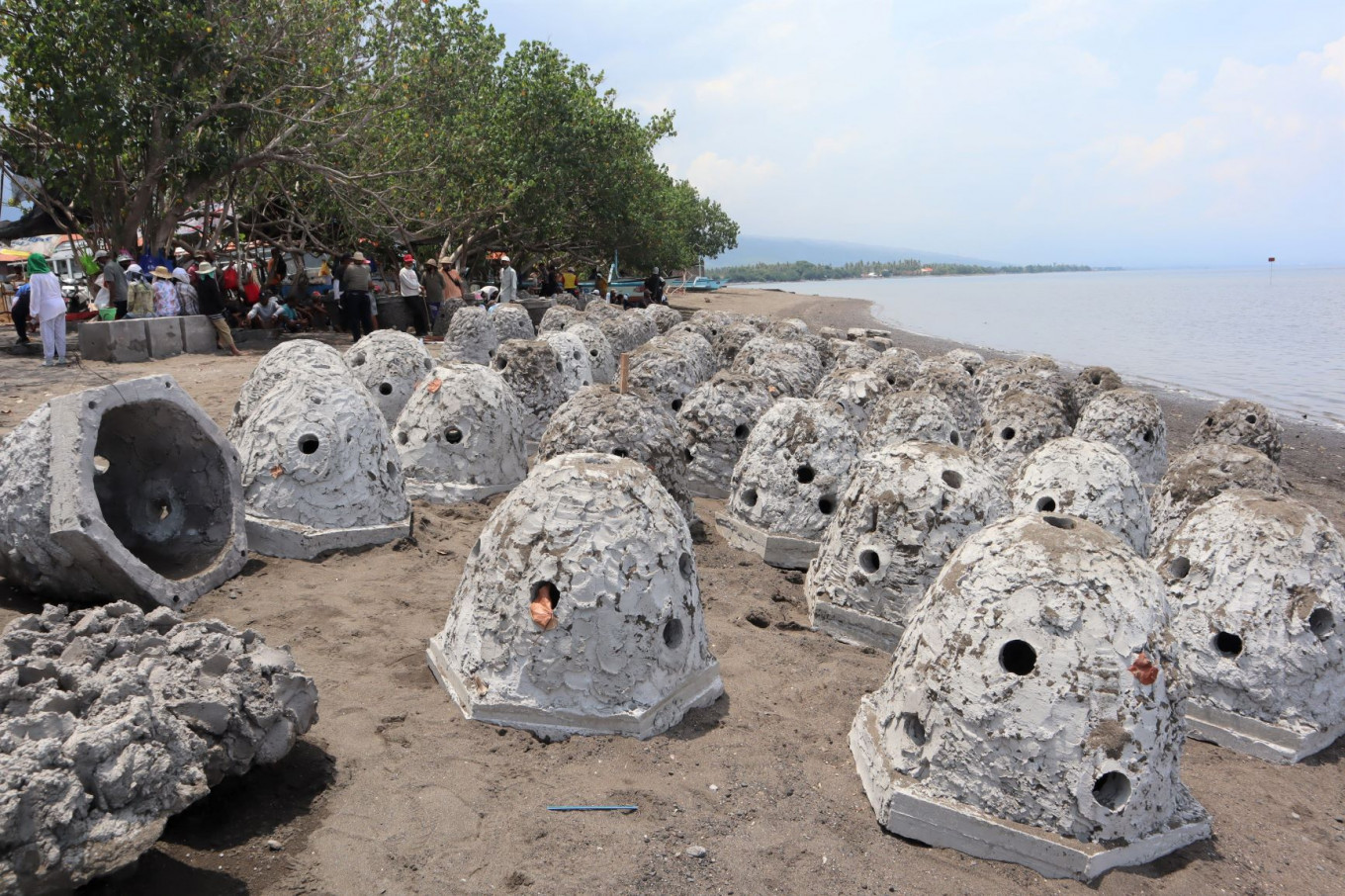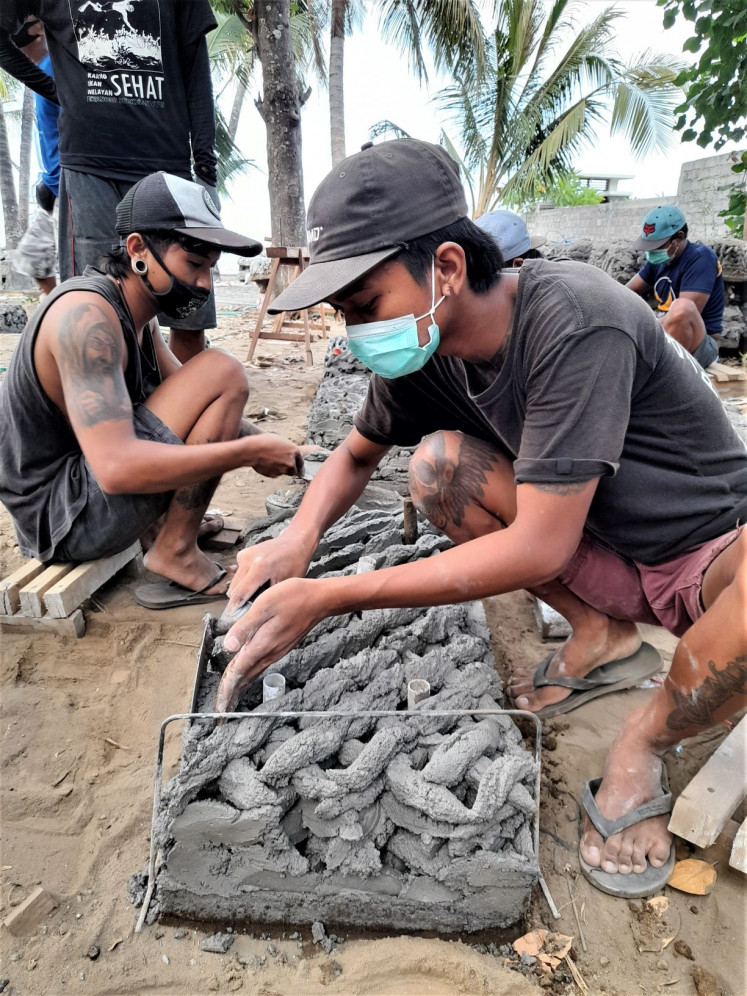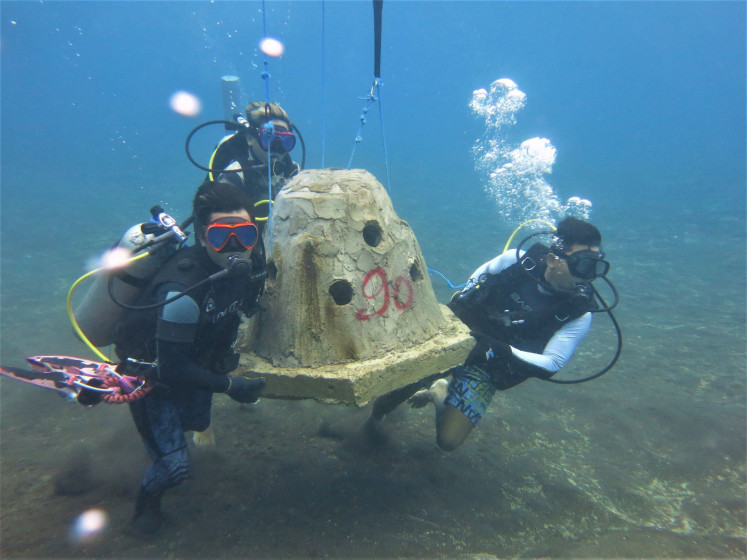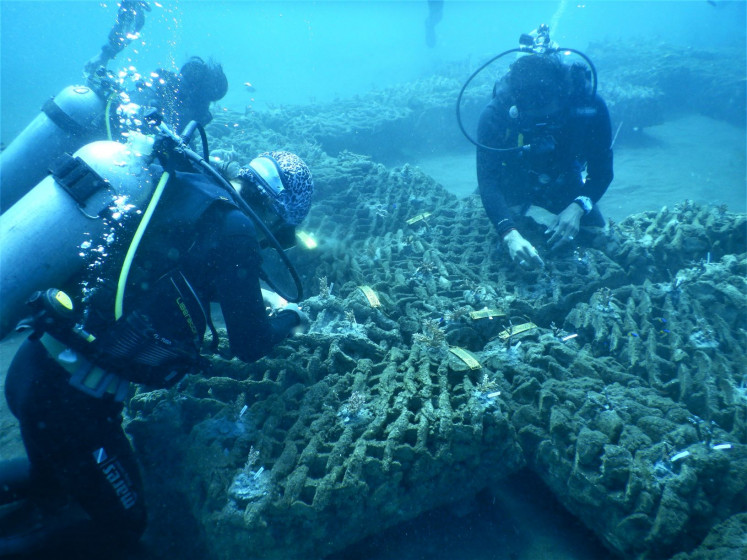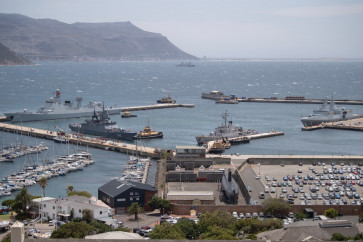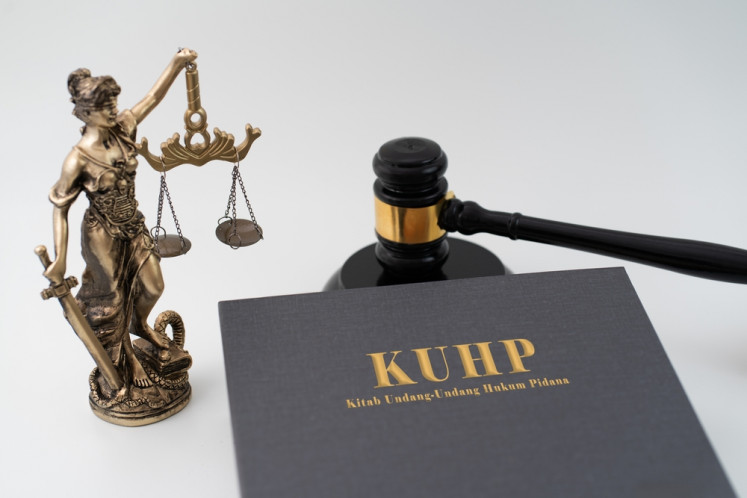Popular Reads
Top Results
Can't find what you're looking for?
View all search resultsPopular Reads
Top Results
Can't find what you're looking for?
View all search resultsCoastal communities help restore Bali’s coral reef
A project to create a coral reef garden in Bali’s coastal areas provides a lifeline to pandemic-hit workers on the resort island while seizing a change to improve the coastal ecosystem.
Change text size
Gift Premium Articles
to Anyone
A
group of villagers gathered near the iconic dolphin statue in Lovina, North Bali that morning in November last year. The once bustling tourist destination was now otherwise quiet.
“It’s been very deserted since March,” said Ketut Artini, a local trader who used to sell fabrics to tourists on the beach, recalling the start of the COVID-19 pandemic.
Today, locals follow the Balinese tradition of ngayah, in which young and old work together for traditional and religious events, with a modern focus.
They line the beach with ropes and bamboo poles to build structures on which coral can be planted, as part of the nation’s largest reef restoration program.
Work in progress: Young people from local communities in Bali build artificial structures for new coral reefs to be grown. (Courtesy of Yayasan Lini/-)The program’s local coordinator, Kadek Fendi Wirawan, said more than 250 people were involved, including workers who had been laid off from the tourist industry, returning migrants and those struggling to find work elsewhere.
Job losses during the pandemic have been widespread in coastal communities, which directly or indirectly rely on tourism.
Bali’s Statistics Indonesia office disclosed that Bali, Indonesia's main tourist destination, had experienced a 87 percent decline in foreign tourist visits between April and June 2020.
A survey of 152 marine tourism businesses by the Indonesian Diving Business Association (PUSI) also found around one-third had ceased operations.
“Many such as dive guides, drivers and workers in hotels, shops and restaurants have lost their jobs for almost a year since the beginning of the COVID-19 pandemic. This also affects the income of export-oriented fishermen,” said Yunaldi Yahya, field coordinator at Yayasan LINI, a Bali-based nonprofit organization that aims to support the conservation and management of coastal marine resources.
With around 420 species, Bali has high coral diversity, but like other areas around the world, its reefs have experienced severe losses in recent decades due to pressures, including climate change, river pollution, unregulated tourism and irresponsible fishing practices.
There remains, however, an opportunity to manage reefs more actively, through reef restoration.
One model being promoted is building “coral gardens”, which can act as marine conservation areas, as well as tourist sites with economic benefits.
Yahya claims that only about half of Bali's coral reefs are in good condition. Reduced tourism may provide an opportunity for coral reefs to breathe a sigh of relief from the usual pressures of economic activity.
However, research by the Indonesian Institute of Sciences (LIPI) has shown increases in plastic waste, largely blamed on higher online shopping demand, and when not processed properly, polluting marine ecosystems.
Decreased incomes also increase the risk of disruption to the supervision of destructive or illegal activities that threaten reefs.
Reef-building: Divers regenerate Bali's coastal habitat by planting coral saplings on new reef structures. (Courtesy of Yayasan Lini/-)Midway through 2020, the Maritime Affairs and Fisheries Ministry sought to support the maritime tourist sector, disrupted by the pandemic, through the Indonesian Coral Reef Garden (ICRG) project.
The project aims to employ workers affected by the pandemic, while seizing a chance to improve coastal ecosystems’ management and create new jobs in marine tourism for the future.
Five coastal areas in Bali chosen to be part of the pilot project for the ICRG were facilitated by three NGOs: Yayasan LINI (for Buleleng, North Bali), Yayasan Kebun Koral (for Sanur and Serangan) and Yayasan Asosiasi Koral Kerang dan Ikan Hias Indonesia (for Nusa Dua and Pandawa).
Carried out from October to December 2020, the Rp 105 billion (US$7.46 million) project involved some 10,000 workers, mostly from the tourist sector, including boat owners, drivers and fishermen.
They were trained to create more than 95,000 artificial structures of various kinds, planted across a total of 74 hectares areas.
Over 60 percent of workers lacked prior experience in construction, with other challenges – such as adhering to COVID protocols during hot weather and the rainy season – hindering progress of divers. Each structure needs to be fitted with coral fragments to stimulate saplings’ growth.
The ministry’s marine and fishery resources management director general, TB Haeru Rahayu, said the project was made possible due to cooperation between ranges of stakeholders, from the local to the national level. Maintenance and monitoring are vital next steps.
At Penimbangan Beach, a popular place for young people in Buleleng, over a thousand structures were constructed and submerged around 300-400 meters east of the beach.
“The challenge is monitoring coral is the minimal human resources and maintenance budget,” said Gede Karang Sadnyana, the Coral Reef Garden’s local coordinator in Bakti Seraga village, where the beach is located.
Another challenge is, he added, was explaining the major threat of garbage since Penimbangan was located at the mouth of the Tukad Banyuasri River, which flows from other cities and rivers.
“We will [have to] strengthen capacity and hope that maintenance is not just [given to] one project,” Gede said. (ste)

